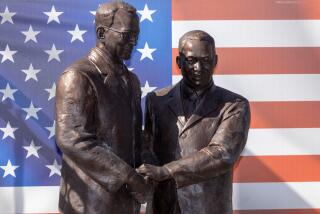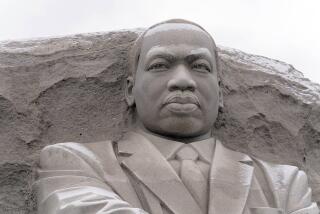Some Speak of Irony at Annual King Day Tribute : Celebration: The slain civil rights leader’s dream for America has become a nightmare, they say at Watts parade and sculpture dedication.
Rene Fisher hung back at the edge of the crowd as politicians and other officials praised Martin Luther King Jr. and his message of social and economic justice.
The occasion was the dedication of a specially commissioned memorial to the slain Nobel Peace Prize winner at a shopping plaza in Watts on Monday, the national holiday celebrating King’s life.
“I’ve been standing here for an hour and I’m still waiting for somebody to talk about some of the things that Martin Luther King would have addressed,” said Fisher, a 39-year-old hairdresser and a lifelong resident of Watts. “I don’t see anybody with any AIDS literature out here. I don’t hear them talking about jobs and violence. It’s nice to have a day to honor Dr. King. But what is going to happen tomorrow?”
Despite her concerns, Fisher said, she would not have missed the dedication of the unfinished Martin Luther King Jr. Memorial by sculptor Charles Dickson at the Martin Luther King Shopping Center on 103rd Street and Compton Avenue. When the installation is completed this week, it will be the first monument in Watts to the civil rights leader.
“The politics of (the dedication ceremony) is bull . . . ,” Fisher said, “but we have to show support for Dr. King’s vision.”
She was one of thousands of people who attended King Day events--ranging from breakfasts to daylong panel discussions--throughout Los Angeles.
The largest by far was the seventh annual Kingdom Day Parade on Martin Luther King Jr. Boulevard that featured a record 185 floats, marching bands and cars bearing celebrities--including, for the first time, Mayor Tom Bradley--moving along its nearly four-mile course.
Police estimated that 250,000 people attended the parade, whose participants and spectators included Latinos, Asian-Americans, whites and blacks.
Like Fisher, many of the paradegoers saw irony in the difference between King’s vision for America in the 1960s and the serious social problems facing the country today.
“He had a dream and this is a nightmare,” said Charlene Davis, a retired game show audience manager. “He’d be sad if he saw what was going on now, with abortion, the gangs, homelessness, discrimination.”
Darryl Ross, a 38-year-old mail carrier who sat a few feet from Davis, said African-Americans believe their quest for “equal justice in the courts” has not been achieved.
As he waited for the parade to start, Ross held a sign in front of his legs calling for the ouster of Superior Court Judge Joyce A. Karlin, who is facing a recall drive by opponents of her decision to sentence a Korean-born grocer to probation in the fatal shooting of a black teen-ager.
Once the parade began, about a dozen others arrived to protest Karlin’s sentencing of Soon Ja Du in the March, 1991, killing of 15-year-old Latasha Harlins. The shooting took place inside Du’s store in South-Central Los Angeles after the two struggled over a $1.79 bottle of orange juice.
The protesters, positioned across the street from the parade reviewing stand, held signs and chanted over a megaphone. Signs calling for Karlin’s ouster also appeared on the parade float sponsored by the City Council of Compton, where Karlin is based.
Compton Mayor Walter R. Tucker III and City Councilwoman Patricia Moore have been at the forefront of the Karlin recall drive.
About 500 Korean-Americans also participated in the parade, organizers said, but made no overt political statements.
There were no confrontations during the parade.
“I’m glad they’re here, I’m glad I’m here,” said Ross. “I have nothing against anybody’s nationality.”
Tolerance is what Martin Luther King Jr. was about, said Mildred Horne of Inglewood.
The parade “gives people inspiration,” she said. “It does help for a few moments to bring people together.”
After the parade, however, trouble started when about 150 youths wandered from the festivities into the nearby Baldwin Hills Crenshaw Plaza mall, authorities said. Security guards reported that 30 to 40 of them began running through the Broadway department store, harassing patrons and clerks. “They were just a big mob, running in and out, up and down the stairs, snatching a few things,” said De Win Francis, a security guard at the store.
Police were called to break up the crowd, which then moved a few blocks south to Leimert Park. “We moved them out of the park, and that was about it,” said Sgt. Craig Kaul, assistant watch commander at the Police Department’s Southwest Division station.
More to Read
Sign up for Essential California
The most important California stories and recommendations in your inbox every morning.
You may occasionally receive promotional content from the Los Angeles Times.










